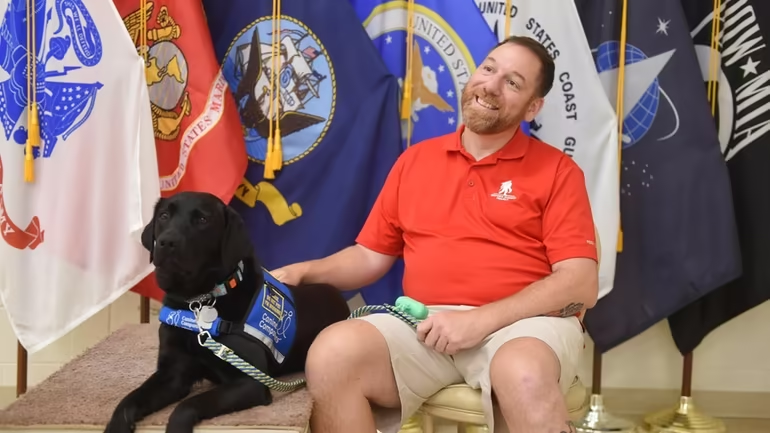By Lisa L. Colangelo – Newsday

“Mira will change the world for me,” said 45-year-old Navy veteran Jason Brooks of the wiggly 2-year-old Labrador, at Canine Companions’ graduation ceremony in Medford on June 7. Credit: John Roca
Service dogs aid veterans with PTSD symptoms
Crippling social anxiety. Nightmares. A traumatic brain injury that made everything worse.
Navy veteran Jason Brooks has battled post-traumatic stress disorder and its symptoms for over 12 years with the help of family, friends and health care providers.
Now he has another partner at his side, a happy, wiggly, 2-year-old black Labrador retriever named Mira who has been specially trained at Canine Companions in Medford to assist veterans like Brooks.
“I have a hard time being with people, large crowds,” said Brooks, a former Avionics Tech 2nd Class, who was stationed in the Middle East after Sept. 11. His anxiety and PTSD can also be triggered by loud noises and fireworks.
“It’s really kind of hampered my family’s ability to go places,” said Brooks, who lives with his wife and two young sons on Cobb Island, Maryland. “Mira will change the world for me.”
He spoke with Newsday earlier this month after an emotional graduation ceremony in Medford that recognized three veterans in the program for completing their two-week training that began in May. Besides Brooks and Mira, Navy veteran Amy Giovinazzo matched with Dudley, a Labrador/golden retriever mix and Air Force veteran Jimmy Schrantz with Maximo, also a Labrador/golden retriever mix.
The dogs are professionally trained for six to nine months at Canine Companions facilities before being matched with a veteran.
Mira was trained to keep Brooks calm when fear or anxiety takes over, with her
Meaningful but subtle actions. She might put her head on his knee or half her body across his lap to settle him. She can gently nudge his nose to wake him at night when he has nightmares.
_________________
WHAT TO KNOW:
*A New Hyde Park couple that helped raise a service dog for veterans with PTSD saw her complete her program.
*A new study shows veterans with specially trained dogs have a decrease in anxiety and other symptoms of PTSD.
*The dogs are trained to help veterans cope with stress, perform tasks and create barriers when in crowded public spaces.
_________________
Other tasks the service dogs are trained for include turning on lights and creating space and barriers for the veteran while in crowds.
Some people develop post-traumatic stress disorder after witnessing or being part of a life-threatening events. Stress reactions that last longer than a month or cause problems in a person’s life could be PTSD, according to the Veteran’s Administration.
A study published this month in the Journal of the American Medical Association Network Open found veterans with service dogs showed improvement in their depression and anxiety as well as quality of life.
One group in the study of 156 participants received service dogs,while the control group remained on a waiting list. After three months, those with the service dogs “had significantly lower PTSD symptom severity,” and lower depression, anxiety and higher psychosocial functioning, such as quality of life and social health.
8,000 dogs trained
Canine Companions provides trained dogs for childrenand adults with disabilities, including veterans, at no cost. In 2018, the nonprofit — which has several training centers around the United States —started a program specifically geared for veterans struggling with PTSD.
It has placed almost 8,000 trained dogs since it was founded in 1975. Over 500 of those placements have been with veterans.
“We all know what dogs can do and how strong that human-animal bond can be,” said Debra Dougherty, executive director of the Northeast region for Canine Companions. “For a veteran with a diagnosis of PTSD, it is an even stronger bond. It’s a best friend, a battle buddy . . . They’re trained to be very attuned to the veteran’s needs.”
Dougherty said many veterans with PTSD who don’t have the confidence or ability to leave their homes are able to do so with a dog.
“That kind of has a ripple effect with family and relationships,” she said. “It enables them to reengage with the community. Some veterans said this has given them a purpose in life, that they need to get up in the morning and take care of their dog. And their dog then in turn takes care of them.”
Brooks admitted he was nervous before meeting Mira at the Medford center, fearing this would be like so many false starts on his recovery. But those worries melted away once they met and started their training program.
“She was so sweet, loving and happy,” he said. “She was just ready to learn.”
Volunteer puppy raisers
A key part of the dog’s training is the 18 months it spends with volunteer puppy raisers. Julie and Craig Barbieri, of New Hyde Park, raised Mira in memory of his brother, Don, a village trustee who lived for years with multiple sclerosis with the help of his service dog, Hallie, from Canine Companions.
At the ceremony, Craig Barbieri handed Mira’s leash to Brooks. Julie Barbieri’s eyes filled with tears as she spoke about Mira’s journey, and how the smart, patient, joy-filled dog was the perfect match for Brooks.
“It’s a blessing for him; it’s a blessing for her and a blessing for us,” said Julie Barbieri. “We always knew she wasn’t ours to keep . . . — she had a higher purpose.”

